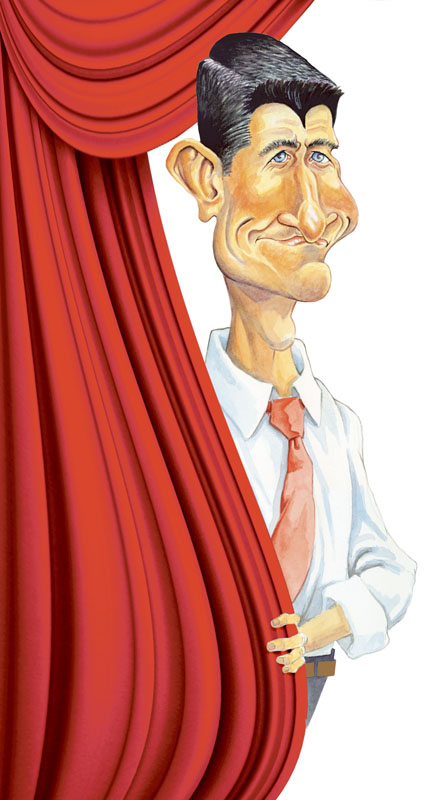WASHINGTON – Since the announcement of Paul Ryan as Mitt Romney’s running mate, much ink has been spilled over the new vice presidential candidate. But perhaps the most significant aspect of the Ryan pick is what it means for the future of the Republican Party.
After all, even if the Romney-Ryan ticket loses in November, Ryan will become the heir apparent to Romney and the de facto leader of the GOP in the years to come. For the Republican Party, the Ryan selection means fiscal conservatism will be the core philosophy and the unifying element in a time when intraparty fissures are becoming evident.
Ronald Reagan’s “three-legged stool” of conservatism — fiscal austerity, traditional social values and a strong national defense — has been a cornerstone of the GOP since his presidency. The stool still exists, but the fiscal leg has gotten longer recently. A Romney-Ryan ticket emphasizes this evolution.
After spending eight years out of power in the 1990s, Republicans returned to the White House in 2000 (albeit by the skin of their teeth) via George W. Bush. During the campaign, Bush aligned himself with “compassionate conservatism,” which stressed greater attention to mitigating social problems and addressing social welfare.
This softer version of conservatism became somewhat lost in the wake of the Sept. 11, 2001, attacks, which brought defense and national security issues to the forefront of political discussion. Defense spending rose accordingly.
But Bush’s Keynesianism — increasing spending in the midst of a deficit — caused some hard-core conservatives to turn on him. Additionally, ongoing American involvement in Iraq and Afghanistan created war fatigue and contributed to growing isolationist sentiment.
By the time of Ron Paul’s presidential run in 2008, there was a strong and vocal libertarian faction in the Republican Party.
At the same time, even though most mainstream Republicans continue to support traditional social values, discussion of social issues increasingly takes a back seat to talk of the economy. A big reason for this is that American opinion on certain social issues is undergoing a shift.
In May 2011, Gallup found that for the first time ever, a majority of Americans supported same-sex marriage. (Nearly three in 10 Republicans supported it, as did three in 10 self-identified conservatives.) Seven in 10 Americans between the ages of 18 and 34 say that same-sex marriage should be legal — a much higher percentage than reported by their elders.
Whereas intraparty differences on national security and social issues have divided the Republican Party of late, fiscal conservatism is the glue holding together tea partyers, libertarians and defense hawks. The mantra of cutting taxes and spending is consistent across all conservative factions, and given the country’s continuing economic struggles, it is destined to be so for some time to come.
Romney, Ryan and the major speakers at last week’s Republican National Convention take conservative social and foreign policy positions. All of them, for example, would consider themselves pro-life, pro-gun and pro-Israel.
But their main policy focus is the economy — cutting taxes, reducing spending and the size of government, and reforming costly government programs. Fiscal austerity is the essence of their conservatism — and it will likely define the party for several elections to come.
And it should. When it comes to dealing with a range of economic issues, Americans tend to believe that Republicans would do a better job than Democrats.
A June NBC/Wall Street Journal poll found that Americans trust Republicans to control government spending more than Democrats by a 40 percent to 23 percent margin. Thirty-seven percent trust Republicans to do a better job on reducing the deficit, compared to 25 percent for Democrats.
In the wake of Ryan’s selection as the vice presidential candidate, there is one area in which Republicans need to exercise some care: They must be careful not to focus too much of their discussion on entitlement programs.
Whereas Republicans have the advantage when it comes to talking about spending, Democrats have the edge on these programs.
On dealing with Medicare, Americans trust Democrats over Republicans by a 40 percent to 24 percent margin. Same goes for Social Security: Democrats have a 36 percent to 24 percent edge on that issue. Democrats have wisely turned the conversation toward these programs since Ryan was added to the Republican ticket, but the GOP must make the economy the main focus again if it hopes to win this fall.
Republicans need to remember a lesson from Bill Clinton’s successful 1992 campaign: It’s the economy, stupid.
Now that Romney has selected Ryan, the two Republicans need to stress that their understanding of fiscal and budget issues will mean a quicker economic recovery for America. If they can convince voters of this, they stand a good chance of taking back the White House.
Jennifer Marsico is a senior research associate at the American Enterprise Institute.
Send questions/comments to the editors.



Success. Please wait for the page to reload. If the page does not reload within 5 seconds, please refresh the page.
Enter your email and password to access comments.
Hi, to comment on stories you must . This profile is in addition to your subscription and website login.
Already have a commenting profile? .
Invalid username/password.
Please check your email to confirm and complete your registration.
Only subscribers are eligible to post comments. Please subscribe or login first for digital access. Here’s why.
Use the form below to reset your password. When you've submitted your account email, we will send an email with a reset code.